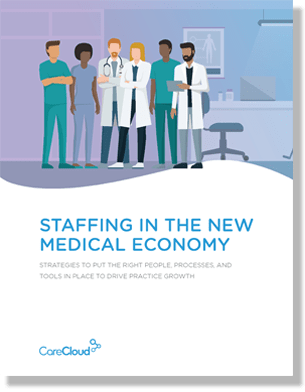As physician practices are planning their electronic health record conversion strategy, they are quickly realizing the numerous choices are overwhelming and the cost seems discouraging.
However, the transition doesn’t have to be as complicated, costly, and painful as it appears. Many small to medium size medical practices are finding web-based EHR systems to be the perfect solution for their clinical needs.
Cloud-Based EHR vs. Client-Server
EHR systems basically fall into two categories: cloud-based or client-server. In a cloud-based system, a practice’s data is stored on external servers and can be accessed via the web, requiring only a computer with an Internet connection.
Client-server systems store data in-house, requiring a server, hardware, and software to be installed in the physician’s office. While in-house servers have traditionally been the norm, practices are increasingly switching to the cloud for a number of reasons.
Benefits of Cloud-Based EHR
1. Implementation is much simpler with cloud-based EHR systems. EHR software runs on the web instead of the computer, meaning no hardware or software installation. Practices can prevent interruption of cash flow and get a faster return on investment with an implementation process much quicker than traditional client-server systems.
2. Practices realize tremendous savings from cloud-based EHR systems. One of the largest hurdles for small medical practices is the initial cost of EHR installation. Client-server systems can cost $40,000 or more just to get set up, and then the licensing fees, maintenance costs, updates and patches cost more on top of that.
Since cloud-based EHR requires no hardware installation or software licenses, implementation is a fraction of the cost. Practices pay a monthly fee, like a utility bill, as part of an arrangement called software as a service (SaaS).
3. IT resource requirements are significantly reduced when practices choose to move medical records to the cloud. Instead of requiring a team of IT experts to install, configure, test, run, secure, and update hardware and software, all of that is done internally in the cloud by the SaaS provider. Updates are also done automatically in web-based systems, so practices are running on the most up-to-date version available.
4. Web-based software provides superior accessibility and collaboration over client-server systems because users are able to securely log in to the system from anywhere they have an Internet connection. The ability to access the system outside of the office allows physicians, staff, and patients to collaborate more effectively in a secure environment and provide better continuity of care.
5. Scalability is simplified with cloud-based systems. Small practices are able to expand without the standard IT growing pains. A web-based EHR system makes it easy to add new users, doctors, or locations. The flexibility of web-based software allows small practices to think big and grow without breaking the bank.
Are Web-Based EHR Systems Safe?
Most physicians who are skeptical of cloud-based EHR systems cite security as a primary concern. While uncertainty is understandable, web-based EHR systems can actually deliver greater security than client-server systems and paper records.
Web-based EHR systems achieve HIPAA compliance through data centers with bank-level security and high-level encryption methods that render data unreadable — even if a security breach occurs. Client-server systems are often left unencrypted and only as secure as the room where they are stored.
Cloud-based data is safer than paper and client-server records in the event of a natural disaster or fire because the data is backed up securely in multiple locations. Backups for client-server records are most vulnerable to breach in transport to storage facilities, unlike cloud systems.
Most people are already allowing a great deal of their sensitive data to be stored in the cloud. Email systems like Gmail and Yahoo! are stored in the cloud. Online banking, shopping, and personal information on social sites like Facebook are all cloud-based systems as well.
Ultimately, cloud-based EHR systems provide users of all sizes and industries great advantages in cost savings, data accessibility, and security. Now, medical practices just have to be willing to look to the cloud for the future of healthcare IT.
Has your practice implemented an EHR? Tell us about it.
DUMMY_TEXT




